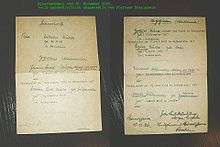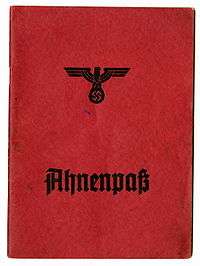Aryan certificate

A 1943 Ariernachweis

Ahnenpass

Ahnentafel used as Ariernachweis
In Nazi Germany, the Aryan certificate (German: Ariernachweis) was a document which certified that a person was a member of the Aryan race. Beginning in April 1933 it was required from all employees and officials in the public sector, including education, according to the Law for the Restoration of the Professional Civil Service.[1]
There were two main types.
- Kleiner Ariernachweis" ("Lesser Aryan certificate") was one of:
- Seven birth or baptism certificates (the person, his parents and grandparents) and three marriage certificates (parents and grandparents) or certified proofs thereof.
- Ahnenpass (literally ancestor's passport)
- Certified genealogy table ("Ahnentafel")
- "Großer Ariernachweis" ("Greater Aryan certificate") was required for compliance with the requirements of "Reichserbhofgesetz" (land heritage law) and membership in the Nazi party. This certificate had to trace the family pedigree down to 1800 (and to 1750 for SS officers). According to the especially strict regulation of this law which included the goal of "Preserving the Purity of German Blood"[2] only those were eligible who could prove (reaching back to January 1, 1800) that "none of their paternal nor their maternal ancestors had Jewish or colored blood".[3]
See also
- German Blood Certificate, for Mischlinge (people of mixed origin)
- Aryan clause
- Nazism and race
- Limpieza de sangre
References
- ↑ Albert Gorter, a prominent minister official gave the definition of Aryan as: The Aryans (also Indo-Germans, Japhetiten) are one of the three branches of the Caucasian (white race);they are divided into the western (European), that is the German, Roman, Greek, Slav, Lett, Celt [and] Albanesen, and the eastern (Asiatic) Aryans, that is the Indian (Hindu) and Iranian (Persian, Afghan, Armenian, Georgian, Kurd). Non-Aryans are therefore:
1. the members of two other races, namely the Mongolian (yellow) and the Negroid (black) races;
2. the members of the two other branches of the Caucasian race, namely the Semites (Jews, Arabs) and Hamites (Berbers). The Finns and the Hungarians belong to the Mongoloid race; but it is hardly the intention of the law to treat them as non-Aryans.
Thus . . . the non-Jewish members of the European Volk are Aryans. . . .
Ehrenreich, Eric (2007). The Nazi Ancestral Proof: Genealogy, Racial Science, and the Final Solution. Indiana University Press. pp. 9, 10. ISBN 978-0-253-11687-1. - ↑ Quotation in German: "Reinhaltung des deutschen Blutes"; in: Isabel Heinemann. "Rasse Siedlung, deutsches Blut", Wallstein Verlag, 1999, ISBN 3-89244-623-7, p. 54
- ↑ Quotation in German: "wer unter seinen Vorfahren väterlicherseits oder mütterlicherseits kein jüdisches oder farbiges Blut hat"; in: Isabel Heinemann. "Rasse Siedlung, deutsches Blut", Wallstein Verlag, 1999, ISBN 3-89244-623-7, p. 54
- Nicholas John Fogg, 'German genealogy during the Nazi period (1933-1945)', in Genealogists' Magazine, vol. 30, no. 9 (London: March 2012) pages 347-362.
This article is issued from Wikipedia - version of the 10/29/2016. The text is available under the Creative Commons Attribution/Share Alike but additional terms may apply for the media files.